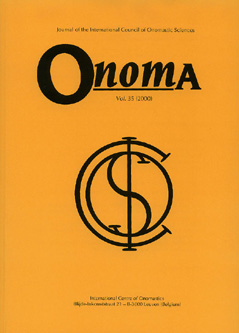 previous article in this issue previous article in this issue | next article in this issue  |

Preview first page |
Document Details : Title: Personal Names in Galicia as a Sign of Cultural Identification Subtitle: Historical Scope and Current Situation Author(s): BOULLÓN AGRELO, Ana Isabel , TATO PLAZA, Fernando R. Journal: Onoma Volume: 34 Date: 1998-1999 Pages: 15-44 DOI: 10.2143/ONO.34.0.2003438 Abstract : The centralist political process which conditioned Spanish historical development for centuries had two negative consequences for Galicia: inability to form its own self-government institutions and permanent obstructio to development of its culture in most fields, particularly in the linguistic field. The political and administrative reorganization which took place with the end of Franco's dictatorship meant the recognition of the historical rights for the Basque, Catalonian and Galician communities, and made it possible to re-enforce the vigour that led to the retrieval of the collective personality in these countries. The language, as the Galician identity's vital core, plays an outstanding role in the process of reconstruction of Galicia's own culture. Taking into account this nuclear function of the Galician language as a way of recovering the community's personality and, furthermore, considering the fact that a restitution and settlement of linguistic uses, unprecedented in former historical epochs, are taking place, although not without tensions, this paper intends to study the consequences that these new parameters may produce over personal names, a field which is so sensitive to socio-cultural changes. Personal names clearly reflect the different cultural tendencies, sometimes opposed tendencies, living in society. When this society bears a linguistic conflict inside, personal names show not only the tendencies in vogue but they are also an indicator of the progress and regress of linguistic and cultural normalization. The main goal of our article will be the description and analysis of these tendencies together with the reexamination of the historical process which led to the present situation. |
|


